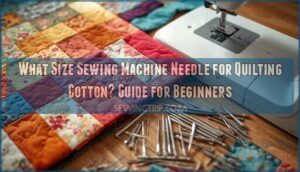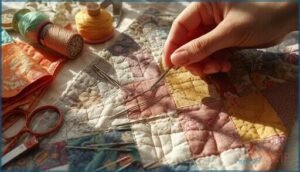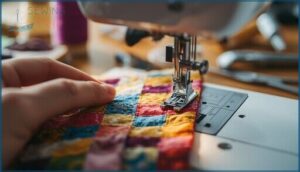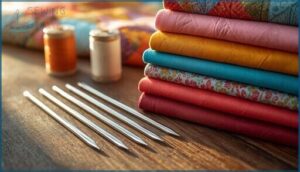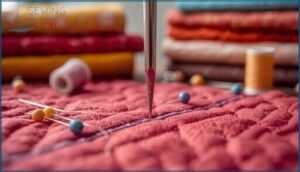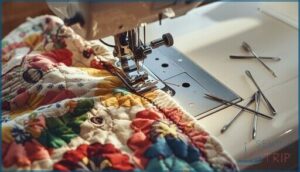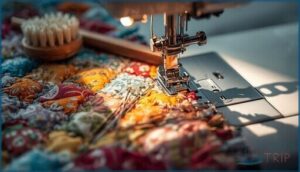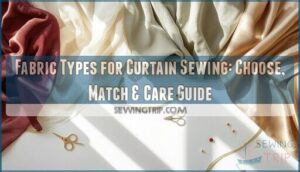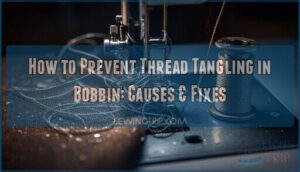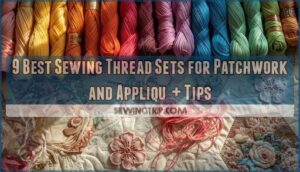This site is supported by our readers. We may earn a commission, at no cost to you, if you purchase through links.
Most sewing mishaps start with the wrong needle. You might spend hours picking out fabric, matching thread, and planning your quilt, but if your needle’s off, frustration sneaks in fast—skipped stitches, puckered seams, or even torn cotton.
Quilting cotton seems forgiving, but it asks for a needle that fits the job. The trick is knowing what size sewing machine needle for quilting cotton will keep your stitches smooth and your fabric happy.
If you’ve ever stood in front of a wall of needle sizes, wondering which one won’t let you down, you’re in the right place. Let’s clear up the confusion and set you up for quilting success.
Table Of Contents
Key Takeaways
- An 80/12 universal needle is the go-to choice for quilting cotton, balancing stitch quality and fabric care for most projects.
- Thicker layers or heavier threads call for a 90/14 needle, while thin cotton fabrics work best with a 70/10 size.
- Skipped stitches, holes, or poor seams often mean your needle size or type isn’t right, so swapping needles regularly is key.
- Universal, quilting, and sharp needles each offer unique benefits for quilting cotton, but matching needle type to your project keeps sewing smooth.
What Size Sewing Machine Needle for Quilting Cotton?
Choosing the right needle size for quilting cotton can make all the difference in your sewing results. It’s not always obvious which one to pick, especially with so many options out there.
Here’s what you need to know before you start your next project.
Recommended Needle Sizes for Quilting Cotton
Needle size charts can feel overwhelming, but for quilting cotton, you’ll want to keep things simple. Most beginners reach for an 80/12 universal needle—trusted for its balanced stitch appearance. For lighter cotton fabric types, a 70/10 works well. Heavier threads or layers? Try a 90/14. To avoid issues like skipped stitches, always choose the correct needle.
Remember these three essentials:
- Fabric thickness
- Thread weight
- Needle brands
Matching Needle Size to Project Type
So, once you’ve sized up your quilting cotton and thread, it’s time to match needle size to your project type. Think about how thick your layers are and how complex the piecing gets. Remember that you should always consider needle and thread compatibility to guarantee smooth sewing.
Here’s a quick guide:
| Project Type | Recommended Needle Size |
|---|---|
| Piecing | 80/12 |
| Thin Layers | 70/10 |
| Heavy Layers | 90/14 |
| Dense Quilting | 90/14 |
Common Industry Guidelines
Once you’ve matched your project to a needle size, it helps to know the industry consensus. Here’s what to expect from standard guidelines:
- Most Quilting Organizations and manufacturers label 80/12 as the standard size for quilting cotton.
- Sewing Quality charts recommend 75/11 for detail and 90/14 for heavy layers.
- Manufacturer Packaging often highlights these sizes for general use and specialized techniques.
Factors Affecting Needle Size Choice
Picking the right sewing machine needle isn’t one-size-fits-all. A few key things help you choose the best fit for your quilting cotton. Here’s what you’ll want to think about next.
Fabric Weight and Density
Ever sew on cotton so crisp you could practically hear it rustle? That’s the magic of quilting cotton’s GSM (grams per square meter) and weave structure.
If your fabric clocks in above 140 GSM or sports a high thread count, you’ll want a slightly larger needle size. Denser cotton types truly put your needle selection skills to the test.
Thread Weight and Type
When picking a needle for quilting cotton, pay close attention to thread weight and type. Your thread and needle selection shapes every stitch.
For a quick thread weight guide:
- Use 80/12 needles with 50 wt cotton or polyester—top quilter thread preference.
- Step up to 90/14 for thicker or 40 wt threads.
- Match cotton to cotton, polyester to polyester, for smooth seams.
Project Thickness and Layers
When you’re quilting, the number of layers—your Layer Count—really matters. More layers mean thicker fabric and tougher Needle Penetration. For example, quilting cotton with batting calls for a bigger Needle Size, like 80/12 or 90/14.
Grading seams and adjusting Stitch Length help too. Needle Selection always depends on Fabric Type and project thickness.
Types of Needles Suitable for Quilting Cotton
Choosing the right needle makes a big difference when you’re working with quilting cotton. There are a few types that work especially well for this fabric.
Here’s what you’ll want to know about each one.
Universal Needles
Did you know universal needles are the unsung heroes of quilting cotton? They balance Needle Point Design, Thread Compatibility, and Stitch Quality—making Sewing Machine Needle Selection a breeze. Here’s why they’re top sellers:
- Their rounded tip glides through cotton.
- 80/12 Needle Size fits most machines.
- Longevity Data shows reliable performance for hours.
Quilting Needles
Think of Quilting Needles as precision tools—designed with a slim, slightly rounded point style that’s gentle on quilting cotton. Their needle eye size accommodates standard threads without snagging.
Brands like Schmetz lead in quilting needle innovations, offering sturdy needle material composition for smooth sewing. If you’re tackling layered projects, these sewing machine needles keep stitches even and fabric intact.
Sharp Needles
Ever wondered why your stitches look crisp on quilting cotton? Sharp Needles are the secret—they slice through dense weaves with minimal Fabric Penetration Force. Their Needle Point Geometry means less drag, while Stitch Density Impact is higher for precise lines. You’ll notice:
Sharp needles create crisp stitches on quilting cotton by slicing through dense weaves with minimal drag for precise lines
- Cleaner seams on Quilting Cotton Weaves
- Reduced Thread Breakage
- Consistent stitch quality, even with tricky Fabric Selection and Thread Choice
Signs You’re Using The Wrong Needle Size
If your sewing isn’t looking or feeling quite right, your needle might be to blame. There are a few telltale signs that mean it’s time to check your needle size. Here’s what to watch for as you sew.
Skipped Stitches and Thread Breakage
Skipped stitches and thread breakage can sneak up like a snag in your favorite sweater. If your needle eye size is too small for your thread, or your needle type isn’t matched for thread compatibility, you’ll see trouble.
Machine timing, poor needle installation, and ignoring preventive practices also mess with stitch formation and thread tension.
Swap needles regularly—your stitches will thank you.
Fabric Damage or Holes
If your fabric looks peppered with holes after sewing, your needle size or type is likely off. A too-large needle can leave big needle-hole surfaces, while the wrong point style causes more fiber breakage and puncture trauma. Tightly woven cotton, in particular, suffers permanent damage.
Environmental exposure only makes these holes worse, so keep an eye on needle maintenance and yarn displacement.
Poor Stitch Quality
Holes aren’t the only warning sign—poor stitch quality crops up fast when your sewing machine needle isn’t right. Tension issues, needle problems, and maintenance lapses all show up as uneven stitches or messy seams. Here’s what to watch for:
- Uneven stitch lengths
- Loopy or skipped stitches
- Thread nests
- Puckering
- Unusual thread breaks
Tips for Maintaining Needle Performance
Keeping your needle in good shape makes a big difference in your sewing results. There are a few easy habits that help your needle last and work well. Here’s what you’ll want to pay attention to.
Frequency of Needle Replacement
Regularly swapping out your sewing machine needle keeps fabric integrity high and stitch quality sharp. For quilting cotton, expert guidelines recommend a replacement interval of 6–8 hours, or sooner if you notice needle fatigue. High-speed impact and heavy projects shorten this window.
Here’s a quick table to help you track:
| Needle Type | Usage Hours | Signs of Fatigue |
|---|---|---|
| Quilting | 6–8 | Skipped stitches |
| Universal | 8 | Thread breakage |
| Titanium-coated | 14 | Dull point, popping |
Proper Needle Storage Solutions
Swapping needles is only half the battle—keeping them organized matters too. Needle Books make sorting easy, while Magnetic Holders keep stray needles from wandering. For safety measures, use containers with lids and clear labeling methods to track Needle Types and sizes. Try a simple numeric system:
- Needle Books for sorting
- Magnetic Holders for storage
- Secure containers for safety
Recognizing Needle Wear and Tear
When you’re quilting, a needle’s sharpness can make or break your stitch quality. Visual inspection catches burrs, while auditory cues like popping or clicking hint at dullness. Watch for fabric effects—snags, puckers, or thread breaks. Lifespan metrics show most sewing machine needles last 8–10 hours. Ignoring wear means risking seam failure.
Here’s a quick table:
| Visual Inspection | Auditory Cues |
|---|---|
| Burrs, snags | Popping, clicks |
| Blunted tip | Knocking sound |
Frequently Asked Questions (FAQs)
What size needle is best for quilting cotton?
For most quilting cotton, a size 80/12 sewing machine needle strikes the best balance. It pierces cleanly without leaving large fabric holes, matches common thread weights, and keeps stitch quality high, even with moderate project layer counts.
What sewing machine needle for poly cotton?
Needle know-how makes all the difference—choose a ballpoint needle type, size 70/10 for lightweight or 80/12 for medium poly cotton.
Pair with polyester thread for top stitch quality, longer needle lifespan, and fewer skipped stitches.
Can I quilt with an 80/12 needle?
Absolutely, you can quilt with an 80/12 needle. It’s the best practice for medium-weight cotton, balancing needle size effects, thread weight match, and cotton layer limits.
Remember replacement frequency—fresh needles keep your quilting sharp and frustration-free.
What is the difference between a quilting needle and a regular needle?
Think of quilting needles as the marathon runners—shorter in needle length, with a tapered tip shape built for endurance through thick quilt layers.
Regular needles handle everyday sewing, but quilting needles boost stitch quality and project functionality, especially for dense fabrics.
How often should I change my quilting needle?
You’ll want to change your quilting needle every 8–10 hours of sewing. That’s the best practice for needle lifespan and machine health.
Needle degradation leads to skipped stitches, so regular replacement keeps your quilting and sewing techniques sharp.
Can I use the same needle for piecing and quilting?
Imagine expecting one trusty tool to tackle every quilting challenge—sounds tempting, right? While Needle Dual-Use is common, switching needle types preserves Stitch Quality Impact, Fabric Integrity, and Needle Lifespan.
Most Quilter Practices favor changing needles between quilting stages.
What causes needles to bend during quilting projects?
Needle deflection happens when sewing speed is too high, fabric wear increases resistance, or machine timing is off. Incorrect installation and choosing the wrong needle types also cause bending.
Regular needle maintenance and troubleshooting help prevent these common quilting issues.
Can I use metallic needles on quilting cotton?
As the saying goes, “The right tool makes light work.” Yes, you can use metallic needles on quilting cotton.
Their larger needle eye size helps prevent thread shredding, improves stitch quality, and extends needle lifespan during metallic thread use.
How does needle color coding help selection?
Spotting a color band on your needle means quick, visual needle identification—no squinting at tiny print.
Color code benefits include error reduction rates and faster selection, but brand color variations and coding standardization issues can cause confusion.
Are specialty needles needed for decorative stitches?
For decorative stitches, specialty needle types like embroidery or topstitch needles are needed. They boost stitch clarity, reduce thread shredding, and extend needle lifespan.
Machine compatibility and fabric distortion issues improve when you match needle types to your project.
Conclusion
Think of your sewing machine needle like a key—choose the right one, and every stitch unlocks smooth progress. I’ve seen a single wrong needle turn a promising quilt into a patchwork of problems.
When you ask what size sewing machine needle for quilting cotton, you’re really asking how to make your quilt sing. Trust your hands, watch your fabric, and let the right needle guide you.
That small choice shapes every block, seam, and story you sew.
- https://www.thepatchworkshop.co.uk/blogs/news/which-size-needles-should-i-use-for-which-fabric
- https://www.mhthread.com/blog/products/what-size-sewing-machine-needle-for-cotton-fabrics
- https://www.sewing.org/files/guidelines/22_115_sewing_machine_needle_charts.pdf
- https://mrsquilty.com/blogs/news/skipped-stitches-thread-needle-and-fabric-solutions
- https://www.schmetzneedles.com/pages/sewing-machine-needle-chart

